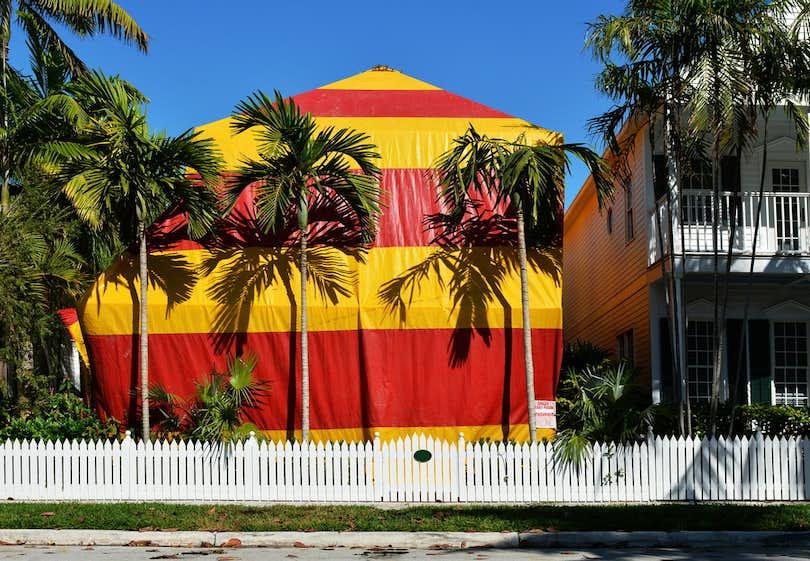How much does a termite inspection cost? | When do you need a termite inspection? | How do you spot a termite infestation? | What happens during a termite inspection? | How do you find a good termite inspector? | What happens if I have termites in my home? | Common termite and pest inspection terms

Termites are nasty little buggers (literally).
In addition to the creepy crawly factor, the small monsters can quickly cause thousands of dollars of structural damage to your home.
How much does a termite inspection cost?
| Service | Average price[1] |
|---|---|
| Stand-alone termite inspection | $50-280 |
| Termite inspection bundled with home inspection | $75-125 |
| Termite letter or report | $100-200 |
The cost of a termite pest inspection in the United States can range $50-280, with $100 as the average price. Some general home inspectors are certified as termite inspectors as well and will bundle the service for an additional $75-100.
When a termite inspection isn't conducted in the context of a home sale, termite treatment companies offer them for free. However, when a property is about to change hands, these companies charge a reasonable fee for the service.
In some situations, a homebuyer may need to provide their lender with a termite letter or report from an inspector that details the condition of the property and any recommendations for termite-related service. Sometimes, termite inspectors charge an additional $100-200 for this document on top of the inspection fee.
A smart realtor can help you navigate the home buying process, including what inspections and documentation you'll need along the way.
>> 🏠 Looking for a realtor? Find a top-rated local real estate agent with Clever today!
When identified early through inspection, termite companies can treat infestations in an affordable localized manner to prevent larger termite issues.
Fumigating your whole home for termites is expensive (thousands of dollars), a hassle (you'll have to move out for several days), and a potential health hazard (because of the toxic chemicals).
It's better to shell out the money to catch these issues upfront than to pay even more to repair them later on.
Within a real estate transaction, the seller typically pays for a termite inspection. The buyer can pay if they are especially motivated to do so.
After the inspection, it's generally the seller's responsibility to pay for any necessary repairs or treatments.
If the termite inspector makes any recommendations to avoid future infestations, it is the buyer's responsibility to decide whether or not to make those changes to the property and subsequently pay for them.
>>MORE: Section 1 & 2 Termite Items: What Are They and Who Pays?
When do you need a termite inspection?
| Termite inspection required | Termite inspection recommended |
|---|---|
| Applying for a VA loan | Home inspector finds signs of potential termite damage |
| Applying for an FHA loan | Regularly as part of general home maintenance |
| Engaging in a home transaction in South Carolina | |
| At the discretion of your lender (typically required in areas with high termite risk levels) |
There are some situations when a termite inspection and report are required during a home transaction. For instance, buyers utilizing a VA loan (insured by the department of Veteran's Affairs) or an FHA loan (backed by the Federal Housing Administration) must present a clean termite report to their lender prior to funding.
Outside of these government loan programs, lenders may require buyers to submit a termite report based on the unique criteria independently determined by the company. For the most part, buyers bidding for homes in areas with a high probability of termite infestation must have the home inspected prior to closing.
South Carolina is the only state that requires a wood destroying organisms (WDO) examination and report as part of all single-family home transactions. This report includes an inspection of pests like wood-boring beetles and termites as well as fungus and dry rot, among others.
Although it may not be mandatory, it is highly recommended that a termite inspection is conducted if a home inspector finds any signs of termite damage.
And, as part of general home maintenance, homeowners should engage a termite specialist regularly to check for colonies. In high-threat areas, these inspections should be performed annually. They can be conducted less often in lower-threat locales.
Termites are certainly pests, but specialized certified professionals are necessary for their treatment and removal. Pest inspection generally refers to the examination of a home by an exterminator for evidence of other pests including but not limited to ants, cockroaches, mice, rats, bats, and snakes.
A pest inspection costs nothing — they are usually free when you have an exterminator out to your home for a quote. Termite inspections can also be free outside of a real estate transaction. But within a transaction there is an inspection and report fee.
For the most part, pest inspections are not conducted when buying or selling a home unless a seller is aware of an issue and wants to resolve it proactively, or if a home inspector sees signs of a serious infestation.
How do you spot a termite infestation?
Termites are silent but destructive. Unfortunately, if you do not have regular termite inspections, you might not discover you have an issue until it’s too late.
Here are some common signs that your home might have a termite problem:
- A visible swarm of insects (some termites have wings, others look like small white ants)
- Cracked or bubbling paint, a sign of frass (termite droppings)
- Wood that sounds hollow when you tap it
- Small piles of sawdust near wood structures
- Mud tubes on exterior walls, wooden beams, or in crawl spaces
- Shed wings (from swarmers) scattered throughout your home
If you notice any of these signs, you should contact an exterminator immediately. The sooner you start getting rid of termites, the better.
What happens during a termite inspection?
During a termite inspection, your pest control company checks:
- Your basement or crawlspace for moisture
- Your foundation for wood debris
- Other "risk areas" that may attract an infestation such as a wooden deck or fence
Most companies now have tools like infrared thermometers, moisture meters, and advanced termite detection systems to ensure they don't miss anything as they inspect your home.
The entire inspection process takes no more than a few hours depending on the size of your home and how many risk areas you have on your property.
How do you find a good termite inspector?
Websites like Angie's List and HomeAdvisor are great places to find termite companies in your area. Be sure to carefully read the reviews and compare different companies and their pricing structures before making your final choice.
Another good resource is The National Pest Management Association, a professional organization for termite and pest inspectors. Its website lists local pest inspection companies that have been certified using its standards.
What happens if I have termites in my home?
Unfortunately, termite treatment costs are significantly more expensive than simply checking for them in the first place.
Repairs of extensive termite damage can cost you upwards of $3,000. According to HomeAdvisor, the current average for whole-home fumigation is $1,000-4,000.
| Treatment | Average cost[1] |
|---|---|
| Localized treatment | $220-911 |
| Whole-home fumigation | $1,000-4,000 |
| Repairs | Dependent on extent and location of damage |
You might have to tear out and rebuild an entire deck, replace important structural beams in your home, or throw out expensive furniture.
If you're able to catch an infestation early through pest inspection, localized treatments may be possible and cost far less. The average localized termite treatment costs $565, ranging $220-911. In most cases, termite treatment companies charge about $10-20 per linear foot.
Common termite and pest inspection terms
As part of the homebuying process, you may encounter these termite-related phrases. Here's a quick overview of what they mean.
- Termite inspection contingency: It is recommended that buyers in areas with a high probability of termite infestation include this in their offer. It notes that the seller will be responsible for treatment and repair if termite issues are found during the inspection process.
- Termite inspection waiver: In homes with shared walls such as condominiums, buyers can present this waiver to lenders in lieu of a termite inspection report. The buyer must be able to provide proof from the homeowners association illustrating that termite treatment is part of the general maintenance plan or already in the budget.
- Termite bond: This is an agreement with a termite company for annual termite inspection and treatment if necessary over an agreed-upon term. It's often offered as a sort of warranty after termite treatment services are provided.
- CL-100: This is the name of the specific WDO report required in home transactions in South Carolina. It addresses all wood destroying pests like termites and carpenter ants, as well as wood rot and general decay.



